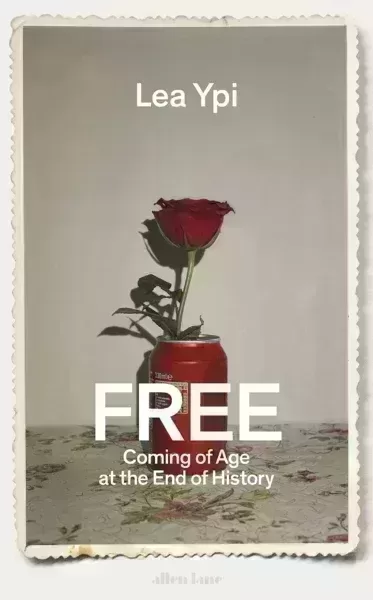
Free: Coming of Age at the End of History
Lea Ypi
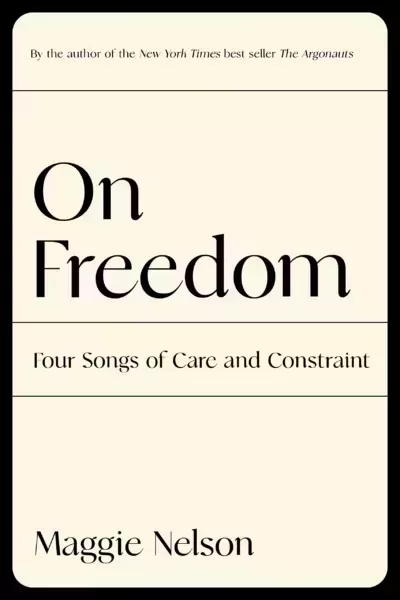
On Freedom: Four Songs of Care and Constraint
Maggie Nelson
Two new books on, or after, freedom
As in love, so in politics: the first cut is the deepest. Lea Ypi was twelve years old on December 12, 1990, when socialism ended in Tirana. That day, everything changed and nothing changed. « The same human beings who had been marching to celebrate socialism and the advance towards communism took to the streets to demand its end », Ypi writes in her memoir, Free: Coming of Age at the End of History. « The representatives of the people declared that the only things they had ever known under socialism were not freedom and democracy but tyranny and coercion. » The party became a party, one of several options at the ballot box. « The Party had gone, but it was still there », Ypi writes. « The Party was above us, but it was also deep inside. »
The narration slips between Ypi, the adult political philosopher, to Ypi, the twelve-year-old multilingual Albanian child, who witnesses these political convulsions with a disorienting sense of wonder. Every day for her whole life, she had woken up to serve communism, « wanting to do something to make it happen faster. » Her teachers and neighbors had told her she was free, and she exercised her freedom by choosing which way to walk home from school. Now, on one of these walks home in December 1990, Ypi accidentally runs into the path of a political protest. She takes shelter at a statue of Stalin and wraps her small arms around his knees. But when she looks up at his face, there is nothing there: Stalin, « the bronze giant with the friendly mustache », had been decapitated. « I covered my mouth to suffocate a scream. »
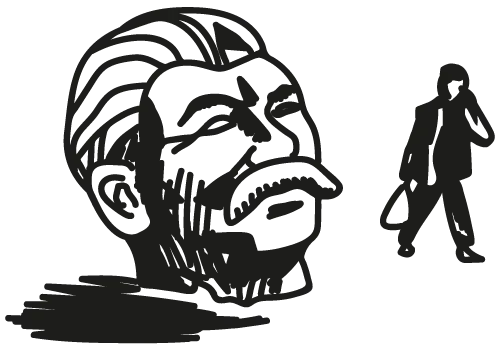
Ypi deftly captures the unique heartbreak of one’s first political disenchantment. Informed that she is free, her younger self begins to experience freedom as something that can be both given and taken, that can arrive and recede, that exists in time and acts on both epochal and microscopic scales. « For the first time I wondered whether freedom and democracy might not be the reality in which we lived but a mysterious future condition about which I knew very little, » Ypi reflects. Her relatives, neighbors, and friends hitch rides on boats bound for Italian ports, hoping to find their fortunes beyond the newly opened Albanian borders. « For some, leaving was a necessity that went under the official name of ‘transition,’ » Ypi writes. « We are a society in transition, it was said, moving from socialism to liberalism, from one-party rule to pluralism, from one place to the other. » Her countrymen grasped for a freedom that had previously been unavailable to them — the freedom to arrive and depart, to disrupt their daily lives in search of fuller ones. But those who were in such a rush to leave did not seem to understand where or why they were going. « Now that nobody stopped us from emigrating, we were no longer welcome on the other side. » Many of them soon returned home, deported and impoverished.

Some of the words she had been raised on disappeared. Dictatorship, proletariat, bourgeoisie, socialism, communism — these were no longer in the lexicon. Other words no longer meant what she thought they did. When, under communism, her parents had spoken of relatives at different universities around the country, they were really speaking about prison camps. When someone « graduated », they had really been released. To say someone « studied international relations » meant that they had been charged with treason; « literature » meant agitation and propaganda. Expulsion meant they had been given a death sentence; dropping out meant suicide. The young Ypi is « dazzled » by the volume of revelations that the socialist collapse unleashed. Her parents inform her that she had in fact been living in an « open-air prison », not a free society. They had always disdained the form of government that she had been raised to serve. They tell her that the pre-communist prime minister, the Popular Party leader Xhafer Ypi, whom she had been taught to loathe and despise, whom they had sworn was no relation, whom she had cursed in the classroom for being a traitor and class enemy since he’d paved the way for the fascist invasion of Albania in 1939 and thanked the Italians for removing the Albanian king — well, he was her great-grandfather.
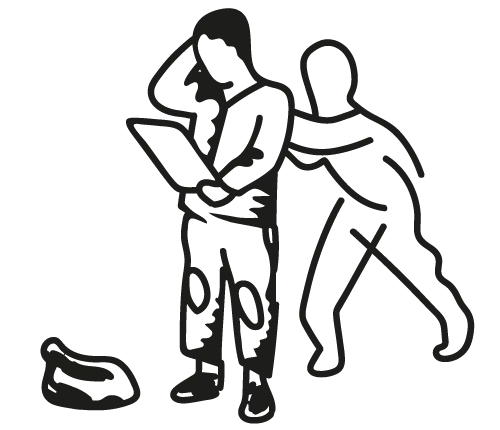
« [T]he society we aspired to create, where class conflict would disappear and the free abilities of each would be fully developed, was gone too, » she writes, « not only as an ideal, not only as a system of rule, but also as a category of thought. Only one word was left: freedom. » At a party in Tirana in the early ‘90s, she hears an angry World Bank man bang this word against the table, refusing to dance (« Do you understand? I am free! »), and she hears it whispered in the family living room. « Freedom » came to signify both a destination and a present condition. (« Freedom works », then-US Secretary of State James Baker told a crowd in Tirana that year.) She stands beside her father in 1995, also now free and promoted to general director of the Tirana port, and together they watch his workers protesting beneath their window because he has been ordered to fire them. « Do you know what we call them? » he asks her, gesturing at the protestors, « Structural reforms. » Her father realized, in this moment, that « he was not as free as he had imagined. »
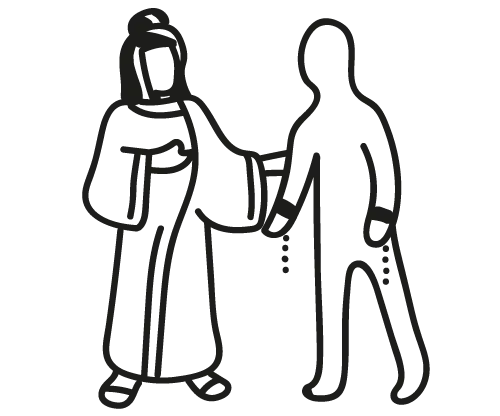
Their new world, like their old one, came with a script. Everyone needed to learn their lines. « The world had acquired a definitive shape before anyone could understand what that shape was. » Ypi remembers watching as her mother, father, and their friends and neighbors fumbled to make sense of their new political surroundings, to situate it within the Albanian national story. « We survived the Turks. We survived the Fascists and the Nazis. We survived the Soviets and the Chinese », her father’s colleagues grumble, « We’ll survive the World Bank. »

What does freedom mean? « Can you think of a more depleted, imprecise, weaponized word? » the American critic Maggie Nelson wonders in the opening lines of her collection of essays, On Freedom: Four Songs of Care and Constraint. The « word itself », she writes, is beguiling, its meaning « not at all self-evident or shared », such that it tends to operate « more like ‘God,’ in that, when we use it, we can never really be sure what, exactly, we’re talking about, or whether we’re talking about the same thing. » The etymology is clarifying: In his comprehensive history of debt, published in 2011, the late anthropologist David Graeber explains that the English word for « free » was inherited from the old Germanic root for « friend », « since to be free meant to be able to make friends, to keep promises, to live within a community of equals. » To be free meant to be in public, to be part of the political world. « This is why freed slaves in Rome became citizens: to be free, by definition, meant to be anchored in a civic community, with all the rights and responsibilities that this entailed. »
We’re a long way from Rome, and a long way from Tirana in 1990, though perhaps not so far as we may once have believed. When these books were published in late 2021, the questions that they pose might have been considered largely theoretical — the contradictions between the American and the former communist imaginations of freedom had not yet come into renewed focus, and Russian troops had not yet unleashed a full-scale war upon the entire territory of Ukraine. « Freedom » may have seemed, to their readers, to be a private, personal pursuit, a concern from yesteryear, more of an Instagram slogan than a contemporary wartime plea. When they were first released, these works spoke past one another from half a world away. Putting them in conversation with one another exposes how little we understand our own freedoms, and the forms of unfreedom they also — by necessity — attend. While Ypi portrays a society in which freedom is something proclaimed from abroad, Nelson eyes the perversities of its contemporary American iterations, in which freedom is at once endemic and, she suggests, newly endangered. Nelson surveys the contemporary United States from the scorched terrain of Los Angeles, while Ypi looks back upon her childhood in socialist Albania from her perch at the London School of Economics. Nelson writes from the point of view of surplus, Ypi from dearth. Both turn inwards to consider whether their personal freedoms come at the cost of their public freedoms, examining how conversations about freedom and its limits play out in their classrooms and family rooms. They ask whether the many freedoms they enjoy mean anything if they are not practiced in public, and if they are not passed on — and whether the word « freedom » means anything at all.
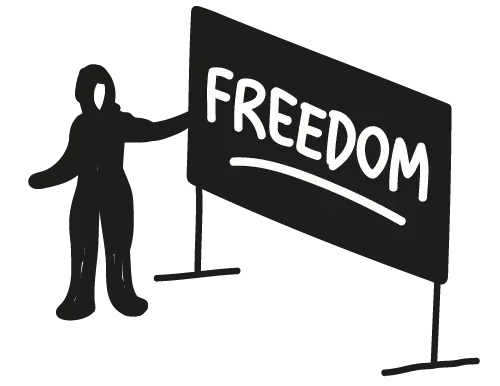
Both Free and On Freedom are, at some level, pedagogical confessions, reflections on the difficulty of discussing the complexities of freedom to students who might not yet have had their own freedoms circumscribed. Nelson’s earlier book, The Argonauts (2015), made her required reading for the seminar room. It was a pioneering work of autotheory that popularized the method of documenting lived experience in order to elucidate theoretical commitments. In it, Nelson chronicled her queer family life and pregnancy, and approached some of the questions that animate On Freedom: what does it mean to « feel free »? And is it ever — or always? — ethical to feel that way? Years later, she finds herself « riveted » by the Buddhist characterization of the classroom as a place where the environment was safe, but « the teachings were threatening. » That this has become a necessary disclaimer reveals just how much the classroom has come to be thought of as private and not public, a place where personal freedom takes precedence over collective freedom. The classroom has become an overburdened site of political production, a site of cultural surveillance and limited philosophical exchange. One need not have spent the past decade in Anglo-American seminar rooms to understand that they have come to represent the current crisis, in that they are places where good-faith disagreements have all too often become the exception, not the rule. Nelson, who teaches at the University of Southern California, seems to be keenly aware of the classroom’s ability to suffocate and swallow up the political realm, to serve as a place where politics is performed, but rarely contested.
Ypi’s pedagogical confession rhymes with Nelson’s. Neither finds the theories satisfying; they both try to bring freedom down to earth. At LSE, Ypi teaches her political theory students that socialism is « above all a theory of human freedom, of how to think about progress in history, of how we adapt to circumstances, but also try to rise above them. » Her epilogue explains that she originally set out to write a « philosophical book about the overlapping ideas of freedom in the liberal and socialist traditions. » But when she started in this academic mode, her « ideas turned to people, » and she found herself recalling the conditions of her childhood. The personal became pedagogical: She tells her students that « a society that claims to enable people to realize their potential, but fails to change the structures that prevent everyone from flourishing, is just as oppressive. And yet, despite all the constraints, we never lose our inner freedom: the freedom to do what is right. »
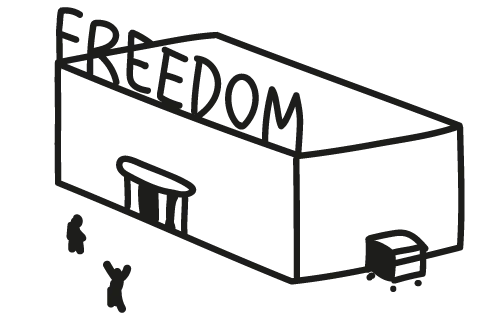
In her own university days in Rome, Ypi became friends with students who were « self-declared socialists — Western socialists, that is. » They told her that what she had lived through was « not really socialism, » and invite her to a Das Kapital reading group where they say she « will learn about real socialism. » Ypi recognized in Marx the words and people of her youth, and thus found her life’s work. As a political theorist, she has aimed to chart how « new forms of agency », and new freedoms, may emerge. In a paper from 2019, she argued that « only a communist society » affords true freedom of agency, which she defined as « freedom as self-liberation, freedom as just rule, and freedom as public willing. » Only in a Marxist society, Ypi’s paper contends, can « individual differences flourish and [be] brought to their maximal development. » Only among the collective — and only by belonging to a public — can anyone actually be free.
Ypi’s scholarly embrace of Marxism, she writes in Free, has baffled her family, especially her mother, who tells her that her grandfather « did not spend fifteen years locked up in prison so that I would leave Albania to defend socialism. » Ypi feels « like someone who is involved in murder, as if the mere association with the ideas of a system that destroyed so many lives in my family were enough to make me the person responsible for pulling the trigger. » Where her mother experienced socialism as a prolonged experience of betrayal, Ypi experienced liberalism as a world of « broken promises ». Re-reading those words, I cannot help but think of how forcefully my Ukrainian friends would agree. A few days before the invasion, one of them posted a selfie of her and her husband smiling on Kyiv’s Independence Square, a Ukrainian flag fluttering over their heads. Her caption: « Kyiv — The capital of the free world! » She was soon woken up by a series of explosions. A Russian cruise missile landed on the street a couple kilometers from her home. « We are alone in this fight », she texted me, when I checked in to make sure they were safe. They helped their toddler to pack up his toys and then headed for the mountains.
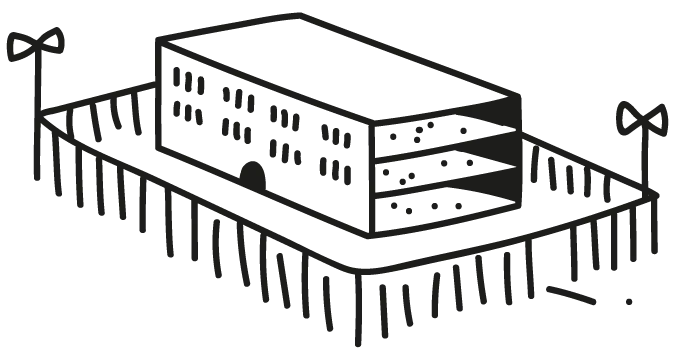
Free is as much about the generational transmission of freedom as it is about its realities and limitations; Ypi’s grandparents and parents practiced freedom under conditions of radical constraint, and Ypi promises herself that she will do the same. « I would find continuity where others saw only rupture », she writes. « I would be the product of freedom rather than necessity. » This sentiment will be familiar to those of her generation, and mine, whose parents cheered the collapse of the communist project and fled, both mentally and physically, as far west as they could, only to find their offspring, decades later, questioning their motivations, newly enchanted by the failed political projects of their past lives. My mother, who immigrated from the Soviet Union to the United States during perestroika, presented it to me quite directly: « You are the only person in our family who can be president », she would often say, reminding me that I was free to be whatever I wanted, to become whomever I thought I should be.
I’m not sure I ever believed her. Being reminded that my freedoms were hard-won — and that I was the only person in the family to enjoy them — only augmented my ambivalence toward them, and my awareness that I was not, after all, living without restraints. Perhaps it is this ambivalence that marks me as American: growing up with a superabundance of liberties makes them all too easy to cast aside. Apparently I share this ambivalence with Nelson, who is captivated by the uncomfortable, demonstrable fact that no one wants to be fully emancipated all of the time. « Ambivalence about responsibility for our own freedom does not mean we are stupid, self-destructive, incapable, or desirous of harm. It means we are human, » Nelson writes in On Freedom. « And part of being human is not always wanting every moment of our lives to be a step on a long march toward emancipation and enlightenment. It also means contending with desires to circle or enter dark rooms. » It can feel good — enlivening and even propulsive — to occasionally abdicate control.
And yet, Nelson worries quite understandably that this very American ambivalence has gotten out of hand, that the « release from responsibilities of all kinds » has gone too far. Over the years she spent writing the book, which coincided with the election and presidency of Donald Trump, she observed what the political theorist Wendy Brown has described as the fusion of a « libidinal ‘freedom and fun’ with a ‘new authoritarian statism,’ » a combination which Nelson believes « has formidable velocity and power ». This cocktail, she observes, has a « particular capacity to appeal » to the young, to the generation that was promised absolute freedom and has little memory of constraint, a generation coming of age just in time to discover that its age was sold off long ago. This generation was promised that liberalism would care for them; they might never recover from the betrayal.
Under the conditions of coalescing catastrophes — planetary jeopardy, political collapse, economic precarity, a non-zero chance of nuclear war — Nelson understands why a « politics of care » has become so appealing. But she is rightly suspicious of its role. « At a time when bigots and thugs deploy ‘free speech’ as a disingenuous, weaponized rallying cry, » she writes, « it makes sense that some would respond by criticizing, refusing, or vilifying the discourse of freedom, and postulating care in its place. » Yet invoking the gospel of care while shutting oneself away from the world seems, to Nelson, too obvious of a reflex, akin to declaring that one is free in the very act of rejecting one’s freedoms. In an interview with The New York Times Magazine, Nelson described herself as « not a big lawn-sign person » — she is not big on static identities, categories, or proclamations. On Freedom is, accordingly, a study of fluidity, of « our conjoined urges toward freedom and unfreedom, self-consolidation and dissolution, interiority and sociality, control and abandon, » and the primary things that enable them: art, sex, and drugs.

Nelson’s critics greeted her reflections with almost uniform hostility — mostly, they seemed to wish that she would put up her lawn sign, just like everyone else. If one were to read only the reviews of On Freedom from New York journals, one might get the impression that the book is positively retrograde, more fascist than freeing. « It seems to me crucial — even ethically crucial — to treat with caution any rhetoric that purports to have all ethical goodness on its side, » Nelson writes. « We need to be able to lodge our complaints without overvaluing complaint as a habit of mind. » These are both perfectly sensible — even banal — political prescriptions. But they might read as insensitive — even provocative — when ethics and aesthetics are collapsed upon each other. It makes sense, then, that much of the critical ire fell on Nelson’s chapter about art, which pushes back against protestors who, in 2017, demanded that two controversial artworks be removed from public viewing. One was Dana Schutz’s oil painting Open Casket, an abstracted rendering of Emmett Till’s corpse. In an open letter to the curators of the Whitney Biennial, the artist Hannah Black argued for the painting’s destruction and removal from public viewing because Schutz, who is white, had « transmute[d] Black suffering into profit and fun ». The other artwork was multimedia artist Sam Durant’s sculpture Scaffold, a composite of seven historical gallows used for executions from 1859 to 2006, including one from which 38 Native American Dakota men were hung in 1862. After an uneventful European tour, the sculpture was erected in Minneapolis upon what used to be Dakota land; protestors argued that it recreated rather than merely represented the gallows, and dared to do so upon stolen ground. The painting stayed up; the sculpture was dismantled and burned. Nelson regards the protestors’ demands as « censorious », invoking the ACLU definition of censorship as something that occurs « whenever some people succeed in imposing their personal, political, or moral values ». (She also noted that a painting or sculpture that is removed from public view does not simply disappear: « the repressed inevitably returns. » The world « comes with no eject button ».) Her suggestion that art can be repulsive, harmful, and unjust — that art can mean everything and nothing, and that that is O.K. — has been received by certain critics, in turn, as somehow retrograde. The Brooklyn-based writer and New York Magazine book critic Andrea Long Chu took aim at this portion of Nelson’s argument in a searching yet somehow sneering review: « Yet surely the left should try to impose its political values on others; if I’m not mistaken, we call this winning, » Chu wrote. « The real question is how to do it without resorting to the gulags. »
The gulags! Tempting? Freeing? Fun? What does Chu mean — what do any of us mean — when we invoke « the gulags »? How many of us know what we mean when we use or encounter that phrase, even those of us whose loved ones lived and died in the camps? « How long before they open the gulags again? » a Los Angeles-based editor tweeted three weeks into the Russian invasion of Ukraine. « It’s not like they ever closed », a decorated Moldovan photographer responded. Americans tend to think of themselves as somehow existing outside of historical time, or at least as occupying the position of the historical timekeeper; they may not realize that in points further east, the clock never stopped running even if the timekeepers left their posts long ago. Between California and Ukraine, there is both a generational lag and a geographical one. The journalist Oksana Baulina, who had relatives on both sides of her family go through the camps and spent much time recording survivors’ stories, was killed by a Russian missile strike in downtown Kyiv, in a neighborhood where I used to meet my friends for drinks. Now I watch her interviews with gulag survivors and mourn her untimely death.
« How many exactly were sent to the gulag? How many perished? » the historian and filmmaker Lilia Topouzova writes in her essay, « On Silence and History », also published in 2021. Born in communist Bulgaria, Topouzova identifies as a child of « the 1989 diasporic generation », one of the kids who left their country after the Berlin Wall came down and who grew up « comfortably inhabiting and traversing East and West ». In 2003, as Bulgaria prepared to join the European Union, she bought herself a « reverse one-way ticket » and started researching the history of the Bulgarian gulags, only to find that the archives remained sealed, the survivors silent, their stories literally rotting upon decaying newspaper pages that she valiantly tries to extract from trash bags. Over the course of her fieldwork, she encounters not simply an ignorance about the past but an « inability to talk about history itself, the failure to find appropriate language to describe the multiplicity of the lived experience of twentieth-century East European Communism and its contradicting realities, emancipatory and repressive at once. » Along the way, she pushes back against her own reluctant self, who questions why she is doing this work in the first place. This self sees how testimonial artifacts have been « lost, damaged, deleted, classified », and thinks, « storage space is hard to come by these days ». Yet she keeps going, despite feeling « powerless » before the sheer volume of archival absences. In 2011, she returns to Bulgaria to interview the last survivors, seeking to free their stories from the « bipolar Cold War framework » of the previous era. « Why pick at old wounds now? » a colleague asks her. « Because they keep on hemorrhaging », Topouzova answers.
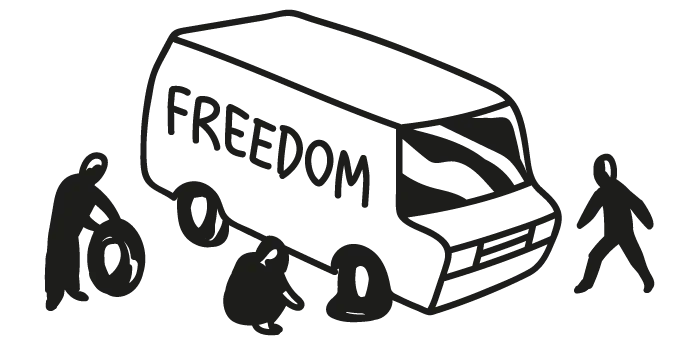
She arrives at survivors’ homes on time, but they tell her she is too late. She finds secret police files on the floor and discovers that the survivors cannot remember. So she begins listening to their silences, to their sighs and stutters, and questions herself again: « Most Bulgarian students confuse the word ‘gulag’ with ‘Google,’ » her reluctant self thinks. « And what of it? » the determined self responds. « Let them be free of the burden of this divisive past that tore families apart — that pit sisters against brothers, neighbors against one another. We will never agree on anything. Water under the bridge. Time to move on. » This time, the reluctant self almost wins out. Why not let them be free? Why not just move on?
But then Topouzova goes to a party. She drinks with a friend who tells her that he doesn’t care about the gulags, that it’s good the Canadians gave her money « to figure this shit out » because most Bulgarians do not care, either. Topouzova pushes back until her friend spits out the truth: his grandfather was in the gulag, and no he never wrote memoirs, nor did he speak about it. But she shouldn’t worry, for « there is always another grandfather » who could tell the same story. Yet there is not always another grandfather, not anymore. It may never be possible to determine how many people, exactly, died in the gulag, but Topouzova listens to the survivors’ silences and gets closer to the truth. When the survivors are not asked to perform, when they are released from what the Bulgarian poet Blaga Dimitrova calls the « bewitched linguistic circle » to which their words were previously confined, from the Cold War language of East and West — then, perhaps, are they and their words finally free.

« What is Freedom? » Hannah Arendt asked in a 1961 essay. Nelson calls it a « wonderfully perverse » piece of writing, for in it, Arendt tried to correct what she viewed as a corrosive confusion between public and private, between freedom and « free will ». She articulated the precise kind of freedom that Bulgarian gulag survivors might feel upon inviting a stranger into their homes and telling her — or rather trying to tell her — what they lived through. Freedom, Arendt argued, can only exist in public, among other people. « This freedom which we take for granted in all political theory and which even those who praise tyranny must still take into account is the very opposite of ‘inner freedom,’ the inward space into which men may escape from external coercion and feel free, » she wrote. The idea that there is such a thing as « inner freedom » was, to her, ridiculous, and in any case « politically irrelevant ». « Without a politically guaranteed public realm, freedom lacks the worldly space to make its appearance, » Arendt argued. « Freedom, which only seldom — in times of crisis or revolution — becomes the direct aim of political action, is actually the reason that men live together in political organization at all. » To be free, as Graeber reminds us, is to be a friend — to be anchored in politics and history, not insulated from them. « It requires courage even to leave the protective security of our four walls and enter the public realm, » Arendt wrote, « not because of particular dangers which may lie in wait for us », but because being in public — and inviting strangers into one’s home — means subjugating one’s own freedom to the freedom of others, to care not for one’s own small life, but for the whole world.
Arendt saw every action as its own beginning, and every new beginning its own miraculous event: « Every act, seen from the perspective not of the agent but of the process in whose framework it occurs and whose automatism it interrupts, is a ‘miracle’ — that is, something which could not be expected. » The message that Nelson’s and Ypi’s books offer is that freedom means nothing on its own, that no one can or should aim to claim it completely; freedom, they remind us, is always attended by submission — submission to history, to others, even to oneself. « No one on earth has absolute freedom to do much of anything, » Nelson writes. Not even the artists are free. « As anyone who has ever tried to install a piece of art with mold on it in a museum or spill blood in a piece of live performance art quickly discovers, such endeavors require planning, permission, negotiation. » We are all stuck together in the thicket of negotiations between past, present, future. These writers regard freedom as a practice rather than a condition, a network of relations rather than a solitary commitment. Nelson urges us to stop « measuring the status of our liberation » against utopian ideals, and to « commit instead to the ride, knowing that certain unfreedoms and suffering will always be part of it, even as we work to diminish their prevalence and force. »
In her final and most powerful chapter, on climate change, Nelson asks what it would mean to commit to this « ride », to go along with and give way to its uncertainties. She tells her reader that she is « writing today with all the windows in my office taped shut and towels stuffed under the doors to block out the hazardous wildfire smoke seeping in from all sides. » The chapter asks what it means to have a child, or to write, or to do anything at all, « given the weird temporal situation we currently find ourselves, wherein our past actions have locked in a certain amount of warming whose effects we have begun to experience », and we know that there are worse things coming still. What freedom, what future is there to speak of? « If the patenting of the steam engine marked the sealing of our fate, perhaps it’s only fitting that one of the most common metaphors for our current predicament is that of being strapped to a runaway train. » She writes this after she watches her young son play in a graveyard of abandoned train cars.
What would it take to think beyond a freedom of arrivals and departures, to see beyond the freedoms and constraints into which we have been born, to remain alert to the new ones that are continuously thrust upon us? These writers reject cynicism and nihilism, and each comes to recognize that Arendt was right when she argued that « the more heavily the scales are weighted in favor of disaster, the more miraculous will the deed done in freedom appear; for it is disaster, not salvation, which always happens automatically and therefore always must appear to be irresistible. »
Reading Arendt’s words, I could not help but think back to an old Albanian story that Ypi mentions in passing. Describing the new world of capitalist Albania, she writes that her neighbors began to act as if « opportunities would never come to you, unless you went looking for them, like the half-cockerel in the old Albanian folktale who travels far away, looking for his kismet, and in the end returns full of gold. » In the folktale, the rooster belongs to a poor old couple who separate and split up their things. The man takes the rooster and the woman takes their cat. Alone, the man becomes so hungry that he cuts the rooster in half, eats one half and keeps the other alive in reserve. The half-rooster, realizing that his days would be numbered if he did not come up with a solution, sets off on a long journey in the hopes of finding fortune. With the help of his animal friends, he succeeds beyond his wildest dreams, securing a miraculous sum of gold coins. He returns with the coins nestled under his wing and in his stomach. Together, the half-rooster and the old man live comfortably for the rest of their days, while, according to one version of the story, the old woman beats the cat to death and dies of anger.
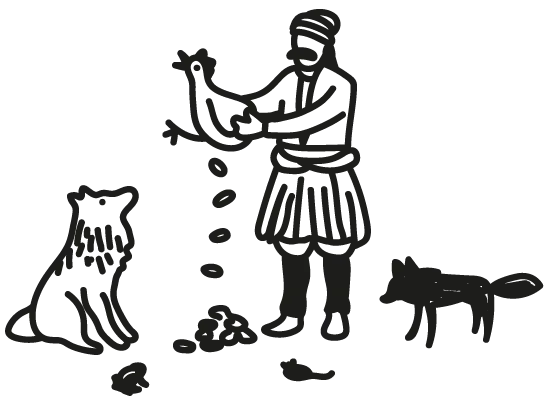
What is the moral of this folktale? It is not simply that opportunity only came when the rooster went looking — nor is it that the rooster could not have succeeded alone, that he owed his triumph to the collective (mouse, fox, frog and wolf) who came to his aid. At first, I thought it might be that having experienced the freedom of the open road, the half-rooster nevertheless returned to his owner: that freedom means nothing without relationships and their constraints. But then it seemed to me that the half-rooster’s discovery of gold is, after all, a miracle, an inexplicable, confounding event that defies all explanation. Miracles are unknowable, yet they alter the known world. They are the agents of contingency, unpredictability and randomness. A miracle interrupts the way things are going, makes the protestors start marching in a new direction, turns the train around but does not end the ride. We don’t really speak of miracles anymore, and yet an openness to the miraculous possibilities of political freedom is ultimately what these works demand. « When you see a system change once, it’s not that difficult to believe that it can change again », Ypi writes. Miracles come in chains, as Arendt reminds us. Every unexpected action makes space for another new beginning. The only question is: what possibilities — what new forms of political freedom — might the next miracle bring?